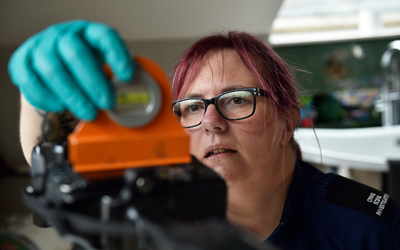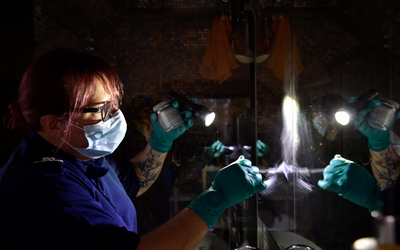Meet Sarah, Crime Scene Investigator CSI
Length of Service: 20 years, I receive my long service medal this year.
 Becoming a CSI …
Becoming a CSI …
It sounds cliché but I always had an interest in crime through enjoyment of fictional Agatha Christie and Miss Marple mysteries. Science was also always an interest from school, when I started looking at careers, forensics had not been civilianised, I didn’t want to be a police officer and the only forensics degree was in Scotland! So, I initially worked in a bio medical lab in a quality control role.
Advancements in forensics meant police forces began to evolve their capability in this area around the mid-90s. Initially Police Officers were ‘SOCO’ (Scene of Crimes Officers) prior to it becoming a police staff role. So, in 2002 this was my opportunity, I joined TVP in a SOCO role, as a Volume Crime Examiner largely working on burglaries and car crime as forces were busy adding data to a new National DNA database to help reduce certain crimes.
Life as a CSI …
We work shifts, either an early or late start and once trained to a certain level will conduct our daily activities single-crewed, which means that we work alone much of the time. We attend many scenes of crime including burglaries and car crime; every house, premises and scene is different and sometimes not the nicest environments. We are there to gather evidence such as fingerprints, footprints, trace evidence, which will help show points of entry and ultimately offenders. We may also attend custody to gather clothing and items from potential offenders. We use different skills and techniques at all different types of crime.
I enjoy meeting people, despite the circumstance and having the ability to communicate is key – you need to be sensitive and have empathy but also be focused on what you are there to do. People are normally pleased to see us because they see us gathering evidence that will help resolve their crime. I enjoy the decision-making that comes with the role; deciding how I approach a new scene never gets old.

A typical day for me involves going out to ‘jobs’ between say 9.30am – 2pm then returning to the station to log and record retrieved evidence.
The evidence we collect is then analysed by other teams within our forensics department.
We often see colleagues when we are back in the office and can share our experiences, this has sometimes led to breakthroughs in cases, for example if we spot a common method of entry, this can link crimes.
Over the years, my experience and ability has developed.
In our new structure, I am a Tier 3 Crime Scene Investigator, which means that I can investigate any level of crime including murders and serious sexual assaults plus manage scenes which may involve a team of CSIs working together.
I am also a tutor, so will go out with a tutee for 3 months training them in our techniques as a part of their development. Tier 1 CSI’s will work volume crime scenes (burglaries etc.) and it can typically take up to 2 years to become a Tier 2.
Working more serious crime …
From Tier 2 onwards, you will attend major crime and more complex and disturbing scenes. You need to be aware this could involve seeing deceased individuals; this can occasionally include sudden death infants, which can be particularly traumatic. It is hard to prepare yourself for that. Working a major crime scene is not as glamourous as you might think; they are often long hard days in not very nice circumstances.
The importance of support …
There is more awareness of mental health and trauma support these days. Helping process what you have experienced can be as simple as talking about your day with colleagues to getting more targeted support, especially if you have experienced something harrowing.
TVP and Warwickshire Police piloted the Emergency Services Trauma Intervention Programme (ESTIP), which is now being rolled out nationally and helps identify colleagues who may be experiencing post-traumatic stress. This can lead to counselling being offered, or having shift patterns reviewed until you feel strong again. We have a dedicated Occupational Health Mental Health Nurse in force, plus a team of trained Peer Supporters as well as access to Oscar Kilo; the national wellbeing service for police.
The future …
I still really enjoy what I do. Being able to make decisions, using my common sense to manage a scene but most importantly dealing with all the different people we encounter. Every circumstance is different, and our work helps the force make a difference.
The key skills for a CSI …
- Communication – ability to speak with victims of crime and police officer colleagues, we often have to manage expectations. A positive customer service approach is important.
- Ability to be calm – sometimes victims can be angry or frustrated, so you need to listen and empathise but ultimately do your job to help achieve justice
- Attention to detail – confidence in your ability as a CSI, you don’t need a degree, but you do need to have a sense of curiosity and a problem-solving approach
–
Learn more about our Forensics department and their current vacancies by visiting our Forensics page.


 Facebook
Facebook
 Twitter
Twitter
 Linkedin
Linkedin
 Instagram
Instagram